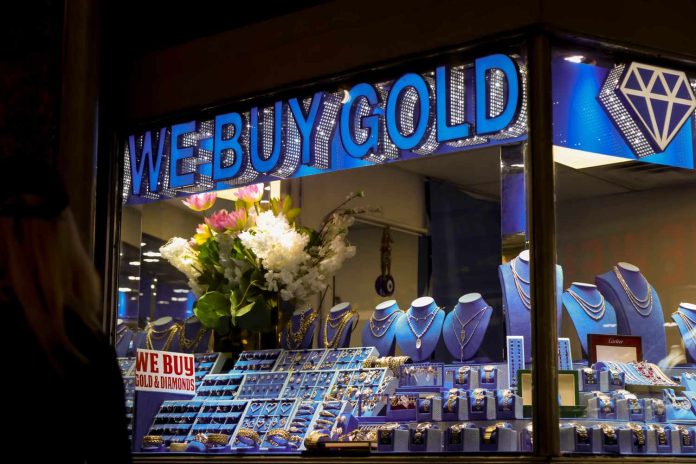Key Takeaways
- Gold prices hit record highs above $4,000 per ounce this fall, tempting many to cash in.
- While selling could get you quick cash, gold’s long-term status as a safe haven during economic turmoil might mean holding off could be the better deal.
- Compare written offers before handing over your gold items—you’ll likely only get an average of 60% to 80% of the current market price for typical gold jewelery when selling to a dealer.
The price of gold is over $4,000 an ounce, and cash-for-gold signs are popping up online and in storefronts nationwide. So you might be wondering: Are those old earrings, coins, or broken chains tucked away in your drawer actually worth something?
Before you rush to the nearest buyer, it’s worth asking: Should you actually sell your gold items, or could waiting pay off even more? And will you even get top dollar?
Gold’s Big Surge—Should You Hold?
People often treat gold as an investment safe haven—a commodity that often retains its value even in the worst of times. Indeed, gold often shines brightest when the economy looks uncertain—investors flock to it when inflation rises or markets wobble, which is why it’s risen so much this year.
So, if economic anxiety sticks around, gold’s value could stay strong or even climb higher. If you need extra money right now, selling some gold could make sense. However, if your finances are stable, holding onto it may prove more savvy in the long run.
How To Sell Your Gold
Before you sell, you’ll need to decide whether you want to deal with someone face-to-face or take your chances online.
Sell Your Gold Valuables to Local Retailers
Start by visiting a local jeweler or gold appraiser who can tell you what your items are worth. An old necklace in your closet could be 24-karat, 14-karat, or 10-karat gold, or just gold-plated—all of which matters a lot. It also might be a very different quality than the person who gave it to you or the stamp on the back suggests.
A jeweler can tell you exactly what grade you’re dealing with and how much it’s worth. For antique dining utensils, picture frames, or heirlooms, try an antique shop. If you’ve got gold coins, head to a bank or a professional collector service.
Jewelers typically pay more than pawn shops, especially for nice pieces, so get at least three quotes before you commit to anything. Search your area for jewelry stores, banks, and dealers that buy gold, then compare the offers.
While there, ask to see the test or weighing done in front of you, and make sure you get a written offer before agreeing to anything.
Tip
You should expect to receive up to about 60% to 80% of the current market price for typical gold jewelry when selling to a dealer—less if the item isn’t pure gold, and more if it’s antique or is a brand that adds value.
Try Selling Online for More Offers
Going to an online gold dealer gives you more choices, which can be especially helpful if your local choices have far more neon in their windows than professional expertise. Working with an authorized agent or reseller can help you get a fair price, though they’ll take a cut of your sale. Most online dealers like JM Bullion and Alloy Market pay through direct deposit or digital transfer—just remember they’ll take a cut for handling the transaction.
If you’d rather skip the dealers, plenty of websites and apps let you sell directly to buyers. You’ll still pay platform fees, but you’re the one naming your asking price.
Before you ship anything or hand over your gold, check reviews online and the Better Business Bureau. You can ask people you trust for recommendations. And don’t be shy about asking any buyer to prove they’re legit—at the least, they should be able to present proof they’re licensed in the location they’re buying.







